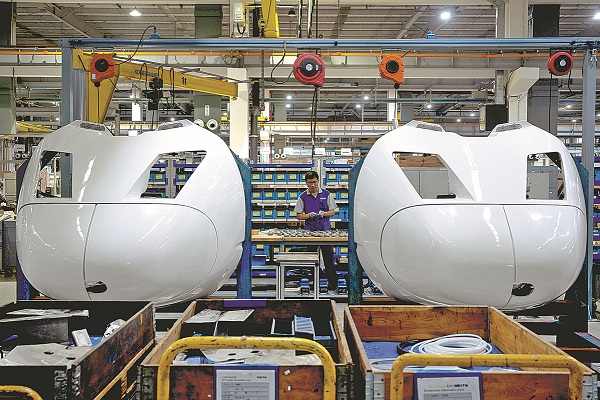Foreign players in Shanghai recovering from COVID woes

A Voith Turbo employee works on the Shanghai assembly line on Thursday. GAO ERQIANG/CHINA DAILY
Preferential financial policies in place to help companies get back on track
With the gradual business recovery from the latest COVID-19 wave in Shanghai, foreign-funded industrial companies based in the city remain confident about development in the Chinese market, while seeking out approaches to adapt their businesses to the challenging times.
The Sika Shanghai Sarnafil factory in Minhang district, which is under the umbrella of Swiss chemicals giant Sika Group, has resumed all production lines after a monthlong suspension from March 28 to April 26.
According to Zhang Yejiong, president of Sika China, the production capacity since June has rebounded to the status before March and has seen a 10 percent increase.
That includes export orders delivered to New Zealand, Japan and Australia. Orders to Southeast Asian countries are being processed, the company revealed.
"We didn't lower our original growth target this year and still expect revenue growth in the double digits," Zhang said.
During the closed-loop management before June, the Xinzhuang Industrial Park, where the factory is based, provided instructions for epidemic control and disinfection, and shared resources for daily necessities for the workers living on site.
The company benefited from preferential financial policies, including tax exemptions and reductions and deferred payments of social insurance and other operating expenses like electricity.
"It strengthened our confidence in business recovery. Although the growth rate slowed this year due to the previous situation of two factories in the city during the temporary lockdown, we're still optimistic about business prospects domestically," he said.
Zhang said he witnessed the determination of the local government to support hard-hit sectors and the Chinese market remains the one with the most dynamic potential worldwide.
"Market potential and revenue are key to our investment. We value the opportunities the domestic market brings and the national strategies in the long term, which expand business possibilities," he said.
Zhang said the green energy field is a good example representing China's aim to peak carbon emissions by 2030 and achieve carbon neutrality by 2060.
In the past few years, the company has laid out a localization plan in the field, covering technology research and production capacity, and achievements have been made so far.
The average annual total of domestic orders on wind power generation molds in Sika's factory, located in the Waigaoqiao Free Trade Zone of the Pudong New Area, in the past three years was more than 100 times the amount a decade ago.
"Plus, the infrastructure field the company has been dedicated to has been promising due to the construction of megacities, including Beijing, Sichuan province's Chengdu and Hunan province's Changsha," Zhang said.
"We'll accelerate exploration of new markets, the launch of advanced products and the application of technologies. Also, cooperation with domestic enterprises will be strengthened."
The main obstacle the company faces, however, is guaranteeing a smooth supply chain for imported materials and export orders.
"In the next two years, we will improve our R&D to localize raw materials. Moreover, the decentralization of manufacturing sites will be another focus, building factories in central and western parts of China, besides eastern areas, so as to dampen COVID-19-related impacts," Zhang said.
Similar work is also underway at German auto parts maker Voith Turbo to mitigate the impact of the pandemic and build up resilience.
Martin Wawra, CEO of Voith Turbo's mobility division, said the performance has not returned to the pre-outbreak level, with the sales plummeting 60 percent year-on-year in the second quarter. The Chinese market contributed to a quarter of the company's global sales of 4.3 billion euros ($4.4 billion) in 2021.
Lower demand from its clients is the main cause of the situation, where orders in heavy-duty trucks-one of the key pillars of the company-declined, due to activity limits in COVID-19 prevention measures globally since 2021.
"Recovery will take time during the next half year and we'll take actions now to reduce the expenditures of the company and consider the products to be offered for additional market segments," Wawra said.
The enterprise will drive the manufacturing of components for hydrogen energy vehicles and ships for the low carbon market.
Effective moves
According to Shi Hong, manager of the Enterprise Service Department of Xinzhuang Industrial Park, over 470 enterprises above the designated size, or companies with their sales income hitting at least 20 million yuan ($2.96 million), in the zone have fully resumed operations in June, of which foreign-funded enterprises account for 76 percent.
As of the end of the first half, 11 new foreign-funded firms have settled in the park, with a foreign investment of $44 million.
At Dohler, a German food and beverage ingredients supplier, production was never suspended during the latest wave, thanks to its permanent COVID-19 crisis team set up in 2020 that reacted in agile and decisive ways, as well as support from the park.
Having seen the cases rising sharply at the beginning of March, the company put the first level of its COVID-19 emergency plan in place with visitor restrictions and work-from-home policies for non-essential employees.
"It's most critical that we received pre-alerts from the park hours before the lockdown," said Roman Kupper, president of Dohler Asia-Pacific.
The alert enabled the company to bring in two full production shifts and a small R&D team on site, to operate seamlessly. After four weeks, difficulties emerged due to heavy restrictions on logistics from warehouses and customers across China.
"It's the second time we received special transportation passes to allow us to continue supplying raw materials to customers and avoid financial hardship, supported by the park."
Despite sales in the March-May period halved compared with the same period of last year, Kupper is confident that the company will close this year stronger than last year-a 30 percent increase or higher-as it has already exceeded the budget.
With economic activities recovering, Kupper said the priorities will be to help their customers get back on track by innovating product portfolios and optimizing current portfolios to stimulate growth.
An additional 40 employees in sales and R&D will be on board in the city during the second half.
"There's a huge gap separating the market and what we sell today: people and Shanghai are providing a great talent pool, along with the nimble and economy-friendly environment," Kupper added.


 China's public holidays for 2025
China's public holidays for 2025  Shanghai FTZ: Go all out to build China's first pilot zone for Silk Road E-commerce cooperation
Shanghai FTZ: Go all out to build China's first pilot zone for Silk Road E-commerce cooperation  Favorable policies boost 'China Travel' trend
Favorable policies boost 'China Travel' trend  play
play 